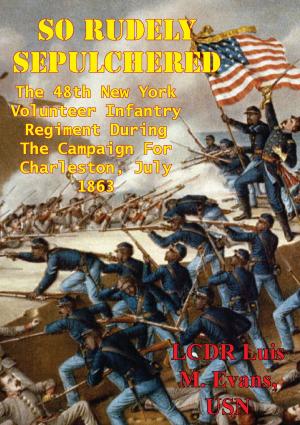Camp Chase, Columbus, Ohio, 1861-1865: A Study Of The Union's Treatment Of Confederate Prisoners
Nonfiction, History, Modern, 19th Century, Americas, United States, Civil War Period (1850-1877), Military| Author: | Major Jack Morris Ivy Jr. | ISBN: | 9781782898849 |
| Publisher: | Golden Springs Publishing | Publication: | August 15, 2014 |
| Imprint: | Golden Springs Publishing | Language: | English |
| Author: | Major Jack Morris Ivy Jr. |
| ISBN: | 9781782898849 |
| Publisher: | Golden Springs Publishing |
| Publication: | August 15, 2014 |
| Imprint: | Golden Springs Publishing |
| Language: | English |
Camp Chase, four miles southeast of Columbus, Ohio, began in May 1861 as a mustering center for units entering Union service during the American Civil War. By June 1861 it picked up additional responsibilities of housing Confederate prisoners captured by Ohio units during the earliest military actions of the war. It eventually expanded to hold 9,423 prisoners in Jan. 1865, which made it one of the larger Union prison camps.
The earliest prisoners were afforded extraordinary leniency by state authorities until the Union government stepped in with rules and regulations. By Oct. 1862, an effective system was in place to secure and care for prisoners. Success continued despite fluxuations in prison population, disease and a constant influx of captured wounded, until Aug. 1864 when rations were reduced in retribution for Confederate treatment of Union captives.
Ration reduction caused prisoners hardships but did not markedly increase mortality. Quality medical care and sanitation kept mortality below Union Army deaths from disease.
As prison population soared during the last months of the war, increasing numbers of wounded, severely exposed and weakened captives joined Camp Chase. Reduced rations continued to pose hardships but ration reduction was offset by superb medical care and sanitation which continued to keep mortality below that experienced by the Union Army from disease.
...Prisoners were well treated up to the time rations were reduced in retaliation for alleged Confederate cruelities to Union prisoners. In spite of this, Camp Chase officials continued to stress sanitation and provide clothing late in the war even though they were not obligated to do so. This demonstrated that officials at Camp Chase were successful in managing a prisoner of war camp, even during the period of Union retaliation.
Camp Chase, four miles southeast of Columbus, Ohio, began in May 1861 as a mustering center for units entering Union service during the American Civil War. By June 1861 it picked up additional responsibilities of housing Confederate prisoners captured by Ohio units during the earliest military actions of the war. It eventually expanded to hold 9,423 prisoners in Jan. 1865, which made it one of the larger Union prison camps.
The earliest prisoners were afforded extraordinary leniency by state authorities until the Union government stepped in with rules and regulations. By Oct. 1862, an effective system was in place to secure and care for prisoners. Success continued despite fluxuations in prison population, disease and a constant influx of captured wounded, until Aug. 1864 when rations were reduced in retribution for Confederate treatment of Union captives.
Ration reduction caused prisoners hardships but did not markedly increase mortality. Quality medical care and sanitation kept mortality below Union Army deaths from disease.
As prison population soared during the last months of the war, increasing numbers of wounded, severely exposed and weakened captives joined Camp Chase. Reduced rations continued to pose hardships but ration reduction was offset by superb medical care and sanitation which continued to keep mortality below that experienced by the Union Army from disease.
...Prisoners were well treated up to the time rations were reduced in retaliation for alleged Confederate cruelities to Union prisoners. In spite of this, Camp Chase officials continued to stress sanitation and provide clothing late in the war even though they were not obligated to do so. This demonstrated that officials at Camp Chase were successful in managing a prisoner of war camp, even during the period of Union retaliation.

![Cover of the book Ordeal By Fire: An Informal History Of The Civil War [Illustrated Edition] by Major Jack Morris Ivy Jr.](https://www.kuoky.com/images/2016/january/300x300/9781786257789-EzyU_300x.jpg)

![Cover of the book Staff Ride Guide - The Battle Of First Bull Run [Illustrated Edition] by Major Jack Morris Ivy Jr.](https://www.kuoky.com/images/2014/august/300x300/9781782894599-MCut_300x.jpg)









![Cover of the book Second Bull Run Staff Ride: Briefing Book [Illustrated Edition] by Major Jack Morris Ivy Jr.](https://www.kuoky.com/images/2014/august/300x300/9781782898597-unEf_300x.jpg)

